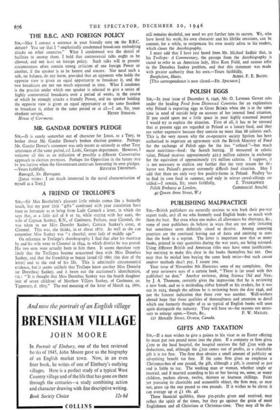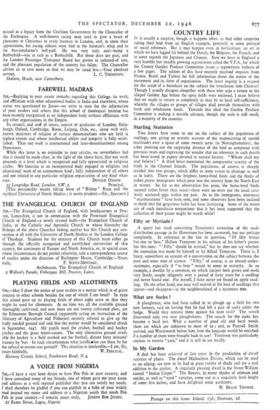GIFTS AND TAXATION
SIR,—If a man wishes to give a guinea to his vicar as an Easter offering he must put two pound notes into the plate. If a company or firm gives Do° to the local hospital, the hospital receives the full Do° with no deductions, and, although the £100 comes out of profits, as a charitable gift it is tax free. The firm thus obtains a small amount of publicity or advertising benefit tax free. If the same firm gives an employee a Christmas-box of one pound, the gift, although a gift, is counted as pay and is liable to tax. The working man or woman, whether single or married, and if married according to his or her having no, some, or many children, pockets eleven, twelve, thirteen or fourteen shillings. Faint yet pursuing its charitable and seasonable object, the firm may, or may not, gross up the one pound to two pounds. If it wishes to be clever it can average up at Lz as. 4d.
These financial quibbles, these pin-pricks given and received, may reflect the spirit of the times, but they go against the grain of most Englishmen and all Christians at Christmas-time. They may all be dis- missed as a legacy from the Coalition Government by the Chancellor of the Exchequer. A well-known racing man used to give a brace of pheasants at Christmas to every busman in London, and, to show their appreciation, his racing colours were tied to the busman's whip and to the bus-conductor's bell-pull. He was very rich, and—being a Rothschild—was as rich as a Rothschild. But those days are past, and the London Passenger Transport Board has grown to unheard-of size, and the pheasant population of the country has fallen. The Chancellor advises us to save more so that we may be taxed less.—Your obedient
servant, L. C. THOMPSON. Shelson, Hoath, near Canterbury.



































 Previous page
Previous page